
The Pony Express was an American express mail service that used relays of horse-mounted riders between Missouri and California. It was operated by the Central Overland California and Pikes Peak Express Company.

William Frederick Cody, known as Buffalo Bill, was an American soldier, bison hunter, and showman.

James Butler Hickok, better known as "Wild Bill" Hickok, was a folk hero of the American Old West known for his life on the frontier as a soldier, scout, lawman, cattle rustler, gunslinger, gambler, showman, and actor, and for his involvement in many famous gunfights. He earned a great deal of notoriety in his own time, much of it bolstered by the many outlandish and often fabricated tales he told about himself. Some contemporaneous reports of his exploits are known to be fictitious, but they remain the basis of much of his fame and reputation.
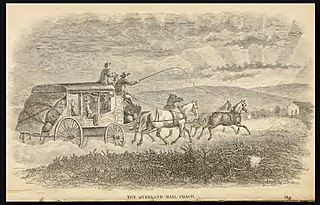
Butterfield Overland Mail was a stagecoach service in the United States operating from 1858 to 1861. It carried passengers and U.S. Mail from two eastern termini, Memphis, Tennessee, and St. Louis, Missouri, to San Francisco, California. The routes from each eastern terminus met at Fort Smith, Arkansas, and then continued through Indian Territory (Oklahoma), Texas, New Mexico, Arizona, Mexico, and California ending in San Francisco. On March 3, 1857, Congress authorized the U.S. postmaster general, at that time Aaron V. Brown, to contract for delivery of the U.S. mail from St. Louis to San Francisco. Prior to this, U.S. Mail bound for the Far West had been delivered by the San Antonio and San Diego Mail Line since June 1857.
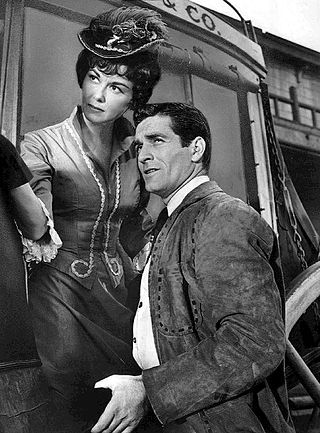
The Life and Legend of Wyatt Earp is the first Western television series written for adults. It premiered four days before Gunsmoke on September 6, 1955. Two weeks later came the Clint Walker western Cheyenne. The series is loosely based on the life of frontier marshal Wyatt Earp. The half-hour, black-and-white program aired for six seasons on ABC from 1955 to 1961, with Hugh O'Brian in the title role.

The Central Overland California and Pike's Peak Express Company was a stagecoach line that operated in the American West in the early 1860s, but it is most well known as the parent company of the Pony Express. It was formed as a subsidiary of the freighting company Russell, Majors, and Waddell, after the latter two partners bought out Russell's stage line, the Leavenworth and Pikes Peak Express Company. The stage line had made its first journey from Westport, Missouri, to Denver on March 9, 1859.

William Hepburn Russell (1812–1872) was an American businessman. He was a partner, along with Alexander Majors and William B. Waddell, in the freighting firm Russell, Majors, and Waddell and the stagecoach company the Central Overland California and Pikes Peak Express Company which was the parent company of the Pony Express. His public life is one of numerous business ventures, some successful and some failed. While Russell, described as a good-looking man, lived the majority of his life on the edge on the western frontier, he was always more at home in the upper-class settings of the East coast.

Alexander Majors was an American businessman, who along with William Hepburn Russell and William B. Waddell founded the Pony Express, based in St. Joseph, Missouri. This was one of the westernmost points east of the Missouri River from its upper portion beyond that state. It was a major supply point for migrants and pioneers headed west to Oregon Country.

Henry Andrew "Heck" Thomas was a lawman on the American frontier, most notably in Indian Territory. He was known for helping bring law and order to the region. In 1889 as a deputy in Fort Smith, Arkansas, he tried to capture Ned Christie (Cherokee), wanted as a suspect in the killing of a US marshal.

Wild West shows were traveling vaudeville performances in the United States and Europe that existed around 1870–1920. The shows began as theatrical stage productions and evolved into open-air shows that depicted romanticized stereotypes of cowboys, Plains Indians, army scouts, outlaws, and wild animals that existed in the American West. While some of the storylines and characters were based on historical events, others were fictional or sensationalized.
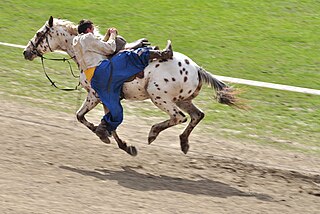
Jigit is a word used in the North Caucasus and Central Asia to describe a skillful and brave equestrian, or a brave person in general. The word is of Turkic origin.

Robert "Pony Bob" Haslam was a Pony Express rider in the American Old West. He came to the United States as a teenager and was hired by Bolivar Roberts, helped build the stations, and was assigned the run from Friday's Station to Buckland Station near Fort Churchill, 75 miles to the east. Perhaps his greatest ride, 120 miles in 8 hours and 20 minutes while wounded, was an important contribution to the fastest trip ever made by the Pony Express. The message carried was Abraham Lincoln's Inaugural Address. After the Pony Express, Haslam returned as an employee of Wells, Fargo & Company, which operated its own enterprise between San Francisco and Virginia City. He later served as a Deputy United States Marshall in Salt Lake City. In his final years he worked in the Hotel Congress in Chicago. He made a personal business card with a sketch of himself as a Pony Express rider at the age of twenty and entertained guests with stories of his adventures.
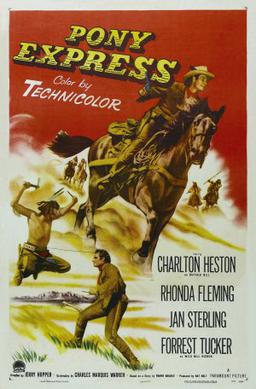
Pony Express is a 1953 American Western film directed by Jerry Hopper, filmed in Kanab, Utah, and starring Charlton Heston as Buffalo Bill, Forrest Tucker as Wild Bill Hickok, Jan Sterling as a Calamity Jane-type character, and Rhonda Fleming. The story is largely based on the 1925 silent film The Pony Express while the threat of a Californian secession is taken from Frontier Pony Express (1939).

William Sloan Tough aka "Captain Tough", "Tufts" or "Tuff" was an American guerrilla fighter who served with the Kansas Red Legs which fought on the Kansas-Missouri Border during the American Civil War in support of the Union. Born in Maryland, he moved to Missouri as a young man and joined the Red Legs before the Civil War. After the war, he married and opened a livery stable. He was also appointed a United States Marshall and was elected to the Kansas House of Representatives. He later fell ill and died in 1904.
The Overland Trail was a stagecoach and wagon trail in the American West during the 19th century. While portions of the route had been used by explorers and trappers since the 1820s, the Overland Trail was most heavily used in the 1860s as a route alternative to the Oregon, California, and Mormon trails through central Wyoming. The Overland Trail was famously used by the Overland Stage Company owned by Ben Holladay to run mail and passengers to Salt Lake City, Utah, via stagecoaches in the early 1860s. Starting from Atchison, Kansas, the trail descended into Colorado before looping back up to southern Wyoming and rejoining the Oregon Trail at Fort Bridger. The stage line operated until 1869 when the completion of the First transcontinental railroad eliminated the need for mail service via stagecoach.
National Pony Express Association (NPEA) is a non-profit, volunteer-led historical organization. Its purpose is to preserve the original Pony Express trail and to continue the memory and importance of Pony Express in American history in partnership with the National Park Service, Pony Express Trail Association, and the Oregon-California Trails Association.

A Pony Express mochila was a removable lightweight leather cover put over a horse saddle for carrying mail and was used by the Pony Express.
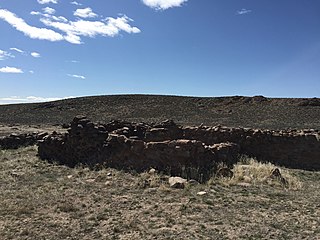
Cold Springs Pony Express Station Ruins, in Churchill County, Nevada near Frenchman, are the ruins of a Pony Express station built in 1860 or 1861. The ruins were listed as a 9.9-acre (4.0 ha) historic site on the National Register of Historic Places in 1972.
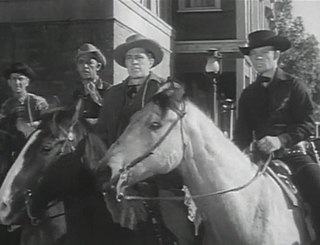
Luther Palmer was an American film and television actor. He appeared in over 300 films and television programs between 1929 and 1962.
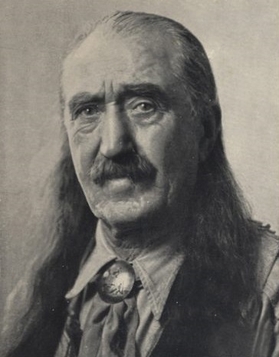
Julius Mortimer "Bronc(h)o Charlie" Miller was an American horse tamer and Pony Express rider. He was born on the trail in California to parents travelling west for the California Gold Rush. At the age of 11 Miller claimed to have become the youngest ever Pony Express rider, claiming to have done so after witnessing a horse arrive without its rider at the station in Sacramento. Miller then worked as a horse trainer, from which he earnt his nickname, including a period working on Teddy Roosevelt's cattle ranch. Afterwards he became a performer demonstrating roping techniques, horse riding and knife throwing. On his travels he met and married Carrie Potter, who joined and became a target girl in his act.


















